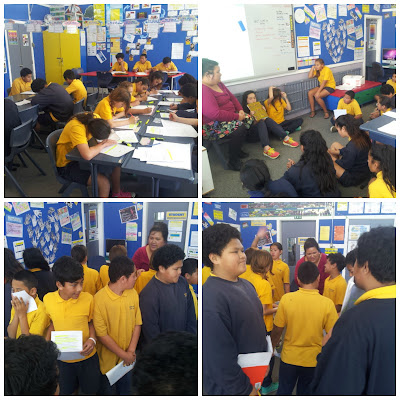TPS places a strong emphasis on fostering Tuakana/Teina relationships within the school, blending the Maori concept of Ako, learning and teaching from one another, with Vygotsky's idea of learning from the 'expert other' through scaffolding.
The mentor/PRT relationship is a great example of this process and Aireen and I have enjoyed almost two years of learning and teaching with, and from, one another. I recently had an couple of mentor observations; Aireen watched me teach, both a whole class lesson and 2 group instruction sessions, on written language. I received really useful feedback and feed forward and had very helpful professional discussions about where to next with my students' learning and lesson planning.
Our written language programme is integrated with our inquiry topic of Practicing Peaceful Play and is focussed on speech writing. I first introduced the speech topic - "why it is important to practice peaceful play" and discussed the key features of an speech introduction.
Working with what Aireen observed during my lessons and the level that the students were working at, we discussed what the next series of lessons would need to focus on. Aireen came into our classroom and led an awesome lesson solidifying and building on what the students already knew.
I saw repetition of key ideas, detailed scaffolding, student movement around the class, whole class/buddy/small group discussions, talk moves, think/pair/share, and student independent reflection and evaluation.
To assist the lesson I created a detailed speech writing success criteria, along with exemplars of an introduction paragraph and structured explanation paragraph. These were written to a level 4 (Year 8 standard). These was used for annotation and as a learning and teaching tool for the students to refer back to when evaluating their own speeches.
After a whole class discussion and scaffolding of the learning task, students identified and highlighted examples of the key elements of an introduction and then shared these with the whole class. You can see from the photo below that clarification was necessary through whole class discussion to clearly show different elements of an introduction.
Here you can see the students working independently, discussing and re-voicing ideas together on the mat, and taking part in the fantastic 'doughnut' sharing technique.
I was able to observe and discuss with Aireen all the different strategies she used during the lesson and gain an understanding of why she used them, along with identifying the needs of the students and seeing how Aireen adapted the lesson to meet those needs. The lesson was slowed right down and ideas were repeated and re-voiced again and again. It was great to see by the end of the lesson that all students were able to produce an introduction with all the key elements.
Another lesson was delivered in a team-teaching style the following week with both the Year 7 & Year 8 students (both Aireen's and my class). This lesson allowed me to put together how I teach, with the ideas and techniques that Aireen utilises. Delivering the lesson together allowed us to 'riff off' each other and build on our existing written language techniques and strategies. We were also able to identify specific areas of the writing process the students were struggling with and target those with tailor-made resources and more exemplars and discussion.


